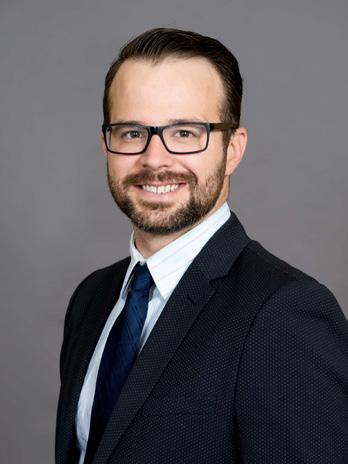
6 minute read
New Curriculum
FRITZ KNOEBEL'S NEW CURRICULUM
In the fall of 2007 the Fritz Knoebel faculty undertook the task of a major curriculum overhaul. The curriculum taught through spring of 2016 was the result of that process and several minor adjustments to the curriculum that emerged and was approved in the spring of 2008. This curriculum represented significant improvement over the past and provided some competitive advantage for the school among its peers. One of the key elements of the revision was the creation of informal areas of focus for students to pursue. The hospitality industry really needed, and still needs, specialists graduating from four year degree programs, people who can add value from day one on the job—even in a management development program. The three focus areas, Lodging/Resorts, Restaurants/Food & Beverage, and Hospitality Sales & Marketing, addressed this end-user need and provided students with a significantly improved education. They also drew on the then current faculty expertise.
The intervening years have seen turnover in faculty—only two members of current full-time, tenure track faculty participated in the curriculum revision 10 years ago. Our new team is forward thinking and recognized the opportunity to once again revamp the curriculum, drawing on what we already do well but seeking to meet industry needs in areas that present the greatest opportunities for the career success of our future alumni.
A year of discussion internally, including our industry faculty, and with external stakeholders, led to a new curriculum in which students choose from among four formal concentrations. Students declare a concentration by winter of junior year, and the concentration appears on students’ transcripts. The four concentrations are presented below in tabular form, preceded by the core curriculum in the major. The rationale underlying the changes to the core and the concentrations follows and describes these changes. The prefix for all course numbers, unless otherwise specified is now HOSP. HRTM has been officially retired.
HOSPITALITY MANAGEMENT CORE CURRICULUM
Core Course Course Credits Core Course
Exploring Hospitality Hospitality Work Experience Managing a Restaurant Business Hotel & Resort Management Revenue Management International Experience 1100 1200 2360 2401 2402 2201 2 0 4 4 4 0 Management Internship Managing Human Capital in Hospitality Hospitality Cost Management Hospitality Technology & Analytics Distinguished Lecture Series Business of the Built Environment
Total core credits Course
2202 2501 2502 2504 3120
REAL 1700
Credits
0 4 4 4 1 4
31
HOSPITALITY MANAGEMENT CONCENTRATIONS
Lodging Real Estate
Hotel Valuation Hotel Development & Feasibility Real Estate Finance Hotel Asset Management HOSP electives
Course Credits
3601 3600 REAL 3307 3402 2 4 4 4 4
Revenue Mgmt & Analytics
Advanced Revenue Mgmt. Hotel Asset Management Business forecasting & visualization HOSP electives
Total concentration credits 18 Total concentration credits Course
3402 3402
INFO 3200
Credits
4 4 4 6
18
Restaurants/Food & Beverage
Contemporary Cuisine Beverage Management Restaurant Concept Development HOSP electives
Course
2361 3300 3360
Credits
4 4 4 6
Conference Services
Beverage Management or Contemporary Cuisine Hospitality Sales & Marketing Special Event Management HOSP electives
Course
3300 or 2361 3402 3506
Credits
4 4 4 4 6
Lodging Real Estate replaced the lodging/resort management focus for a couple of reasons. First, there is a gap in the marketplace for recent grads with this background. The industry has become one in which there are increasing opportunities for lodging real estate analysts. The concentration also leverages Fritz Knoebel’s position in Daniels quite effectively. Second, industry does not want or need for us to teach operations beyond the introductory/core level. Our students acquire the operations knowledge they need most effectively through the work experience and management internship requirements already in our curriculum. Those interested in careers in lodging/resort operations are now best served by a depth of understanding around the management of the hotel as a real estate asset. This skill set is critical for those who aspire to become general managers or move into corporate positions. Thus, this concentration will serve two audiences, those seeking careers on the real estate side of the business and those pursuing lodging/resort operations.
The Restaurant/Food & Beverage (F&B) concentration is unchanged from the area of focus in terms of required coursework. The classes already in place were appropriate in concept, though we retooled them, elevating what we deliver in the classroom and how we deliver it. These courses do a terrific job of preparing students for F&B careers.
Revenue Management & Analytics is an area we have been discussing for several years and felt ready to launch. We have the faculty expertise among the full-time faculty to effectively deliver on this concentration, drawing one course from the Department of Business Information & Analytics in Daniels. As with the Lodging Real Estate concentration, we want to leverage other units in Daniels rather than duplicate efforts. Students who complete this concentration are among the best-prepared recent graduates in the country for careers that begin in revenue management training positions or with firms like Expedia.
Conference Services enables us to prepare students for entry into one of several sub-fields in hospitality: Lodging sales, catering sales, banquets, and conference services. This concentration is already in high demand—we responded to the student demand in the market without risking their employability.
This package of concentrations and courses positions Knoebel to take the next step in elevating its quality and reputation. Senior leaders in industry, including but not limited to Fritz Knoebel’s Executive Advisory Board, have all spoken with enthusiasm about this strategic direction and excitement about hiring graduates who come through this new curriculum. Our team has spent significant time and energy developing this iteration in our programmatic development.
COMMENTS ON THE NEW CURRICULUM
"The new curriculum better positions our students to compete in the changing hospitality landscape. Hospitality as a profession is becoming more sophisticated and demanding as it moves beyond the 'elegant general manager of a hotel having cocktails in the afternoon with the guests.' Spending class time to focus exclusively on operations management is yesterday. Today it is about strategy, maximizing profits, and competing in a changing landscape characterized by the sharing economy, mobile technologies, innovative distribution channels, and the pressure of quarterly earnings reports. Our students will now be prepared to reach top level positions at the corporate level, particularly in the field of hotel development." –Cheri A. Young, PhD | Associate Professor
"HOSP 2504 Hospitality Technology and Analytics provides much needed training in hospitality technologies and technology-enabled data analytics to the next generation of hospitality managers. This course surveys diverse aspects of technologies that are making the hospitality industry thrive, including consumer-facing hospitality technologies and in-house systems in support of hospitality operation. In addition, this course introduces sought-after skills of data analytics and visualization for business intelligence, which has been defined as the extensive use of data and statistical analysis to drive decisions and actions in the hospitality industry." –Karen Xie, PhD | Assistant Professor
"With the updated curriculum the students of the Fritz Knoebel School of Hospitality Management will continue to be at the forefront of our industry. Four Seasons Hotels & Resorts has had great success with the students of University of Denver and we value that relationship with both them and the University." –Bill Thomas, SPHR, SHRM-SCP | Senior Director of Human Resources, Four Season Hotel Denver
"The curriculum looks great. It is balanced to give students practical and real experience, while being rooted in basic business fundamentals." –Walter Isenberg | President and CEO, Sage Hospitality








